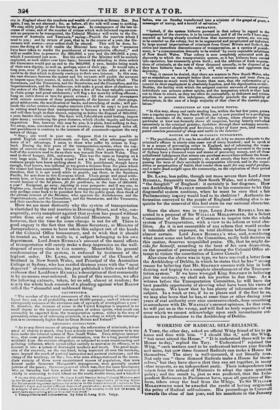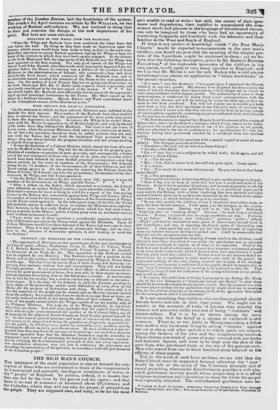WORKING OF RADICAL SELF-RELIANCE.
A TORY, the other day, asked an official Whig friend of his to go home and dine with him. " I should like it," said the Whig, " but must attend the House." "It is understood there will be no House to.day," replied the Tory. " Understood I" rejoined the Whig, " such matters used to be understood between your friends and mine, but now these damned Radicals can make a House for themselves." The story is well-invented, if not literally true. Not only can " these damned Radicals make a House for them- selves," but they have shown that they can act together, in many other respects, as an independent party. Their independence has arisen from the refusal of Ministers to adopt the open question policy ; and the result is, just as was predicted, that the Inde- pendent Reformers in Parliament have, upon all questions of Re- form, taken away the lead from the Whigs. To Sir WILLIAM[ MoLuswonTst must be awarded the credit of having originated the policy of Radical self-reliance. His proceedings in Cornwall towards the close of last year, and his manifesto in the January number of the London Review, laid the foundation of the system. The number fur April contains an article by Sir WILLtast, on the working of Radical self-reliance. We are inclined to thing that he does not overrate the doings or the new importance of his party. But hero are some extracts.
RELIANCE OF THE WHIGS UPON THE RADICALS.
"When the Whigs and Radicals have been combined, the latter have this year taken the lead. By doing so they have made an impression upon the country, which never would have been made so long as they in the main con- fined their exertions to purely Radical questions, leaving the Whips to low the brunt of the contests in which they were both equally engaged. In the ilehatee on the Irish Municipal Bill. the superiority of the Radicals over the Whig. was most apparent on the first reading. The only gnat speech of the Wilig)1 waN that of Lord John Russell, who afterwards most impropei ly demoted hum the question before the House, by entering into a defence of the conduct of Lind iulgrave in the administration of Ireland : tide tweasinned a lung and most discreditable Irish brawl, which continued till Alt. Roebuck rose, and in an admirable speech recalled the attention of the House to the real question at issue. On the motion of Lord Francis Egerton on going into Coin JIIIIre tin the Irish Municipal Bill, Mr. C. Buller made a speech which is generally and most justly considered to be the beet speech of the session. • • • • Oil the second night, Mr. Roebuck must effectually tore to pieces all the argument. urged against municipal institution* by the Tories. Mr. Sheil wound up the debate in a brilliant invective. Messrs. Bulwer and Ward contributed much to the triumphant success of the Alinisterial party."
WHIG RETURN FOR RADICAL ASSISTANCE.
"in the measures to which we have referred, Ministers were indebted to the Radicals fur their success. Then umbers of the Radicals have alone enabled them to outvote the Tories; and the arguments of the same party have given to them the superiority in debete. In return, the Whigs hove united them. selves with the Tories in opposition to all Radical objects, and only by the aid of the latter have they defeated the Radicals. The time is nut yet come, if it ever come, when the present Ministers shall cease to be aristoctuts at heart. On all but a few questions, forced on them by public opinion, they not only tote with the Tories, but put forth the hackneyed Tory pretences for so doing; they are always behind the progress of events, and are always striving to impede that progress." " It was the desertion of a Cabinet Minister which caused the issue of a new writ fur Stafford to be carried. The bill fur the abolition of the property qua- lification of members—a question of mere principle, and, consequently, a better test of the real sentiments of those who voted on it, than any measure which would have been followed by more decided practical consequences—was lost almost entirely by the votes of members of the Government ; 104 Liberals voting fur it ; 11 members of the Government, 21 of their followers, and 101 Tories voting against it. On the motion for removing the Bishops from the House of Lords, 92 Liberals voted fur the proposition ; 10 members of the Go- vernment, 43 Whigs, and 144 Tories against it. " On the Ballot, the numbers for the motion were 155; against it were 12 members of the Government, 45 Whigs. and 210 Tories." * • •
" After a defeat on the Ballot, which amounted to a victory, the Liberal natty achieved, on another Radical motion, a more ostensible victory. Air. T. Ouncombe's motion for leave to bring in a bill for a repeal of the rate-paying clauses in the Reform Act, was carried against both Whigs and Tories; 49 was the number of votes for this measure ; 5 members of the Government, 8 Whigs, and 25 Tories voted agaiust it. In the subsequent stages of the bill, the Tories will probably muster in sufficient force to replace the Ministers in a majority. This, however, is the first really Radical question which has had even a tem- porary majority in the House ; and to a rising party even an accidental success is not without permanent benefit.
" Upon every one of those questions a considerable majority of the whole body of Reformers present in the House voted against the Ministers. Upton till of them Ministers would have been defeated if the Tellies had not come to their assistance. Thus it is that agreement in aristocratic feelings, and an aver- Won to the advance of democratic opinions, is ever tending to unite the two factions."
PROSPECT FOR MINISTERS ON THE CANADA QUESTION.
"The opponents of 31inisters on this question are all the men best known in :lie Liberal party—Hume, Warburton, (;tote, C. Buller, C. Villiers, WetWard,1:. L. Bulwer, Roebuck, Leader, O'Connell, Colonel Thomson, D. Gaekell, the Governor of the Bank, &e. &c. The opposition of the Radicals cannot now be siighted by any Ministry. The Radicals now hold a position in the House, and in the country, which was little expected by Whigs or Tories three months ago. This has been the metal effect of their clearly and distinctly ex- pressing their opinions without fear and concealment. They will not forfeit this high pusition. As yet unsuccessful in their efforts to obtain increased se- curities fur good government at home, they may still, by their steady exertions, prevent injustice from being done to the defenceless colonists. A motion once lost, is lost fur the session ; but a motion carried may be defeated iu the subse quent stages. It is the duty of the Liberals to fiyht the Canada question in every stage of the proceeding, and to avail themselves of every firm of the House for the purpose of destruction and delay. By this course only it is that the attention of the people can be roused, and an effective interest excited about the subject ; fora people who have so much to occupy them at home, are not easily induced to think of feel about the atEtirs of their colonies. The ma- jority of the people cannot believe the Whigs capable of an act worthy only of the Ihilignac Alinistry. The n aj nity at the Whigs probably du not k what they are about. It is still more probable that the right Colonial Secre- taries who in eight years succeeded one another at the Colonial Office, are all as ignorant of the subject of Lower Canada as Lord Stanley proved himself to be. In this state of general ignorance and want of interest on the subject, the only course to be adopted is to bring the question as frequently as possible be .fine the public, by debuting every point, by contesting every position, and by dividing the House on every possible occasion. By such cumluet it is not bit • passible that they may force the measure to be given up : nor need they abantion the more agreeable Mope that the Ministers chemist:lee* may be accessible to argument ? and instead of protecting the bad parts of the Canadian constitu- tion by violating the first fundamental principle of that and every rept emote live constitution whatever, may yet join in redressing the gnevancee and amending the constitution of the province, in accordance with the just demands of the Canadian people."



























 Previous page
Previous page